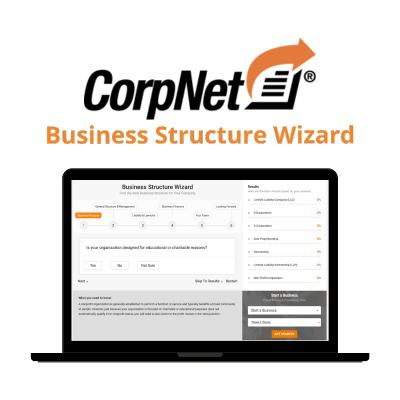If you have a high level of proficiency, expertise, and experience in a field, you may have thought about how to start a consulting business. Starting a consulting business can be a wonderful career option for individuals who want to leverage their knowledge and skills while enjoying the flexibility and autonomy of self-employment. Even if you don’t presently have experience doing the type of work you’re interested in, you may be able to achieve your dream with hard work, education, training, and attention to complying with the professional and legal requirements.
In today’s post, we’ll through the ins and outs of legally starting a consulting business and discuss the nine steps you need to do to set yourself up for success.
Types of Consulting Businesses
Consulting careers come in many forms. Depending on the area of expertise, a consultant might serve consumers or businesses—or both.
Examples of B2C Consultants
- Career counselors
- Interior design consultants
- Wedding planners or consultants
- Pet trainers and behaviorists
- Marriage and relationship counselors
- Life coaches
- Landscaping consultants
- Financial advisors
- Tax advisors
- Personal image consultants
Examples of B2B Consultants
- Leadership coaches
- Interior design consultants
- Business management and process improvement consultants
- Project management professionals
- IT consultants
- Interior design consultants
- Landscaping consultants
- Branding and marketing consultants
- Financial (money management, taxes, and accounting) advisors and consultants
- General business consultants
- HR consultants (hiring, training, etc.)
- Corporate communications consultants
- Public relations (publicity, press relations, crisis management) consultants
These are just a sampling of the types of work that consultants perform.
Important FAQs to Consider
What certifications and special licenses will you need to operate your consulting business?
Depending on the type of consulting, you may need special certifications or a professional license before you can offer your services. For example, financial advisors may not be required by law to have a license to offer advice, but they may need certain securities licenses to sell investment products to clients. As for certifications, although they might not be mandatory, they may help set a consultant apart from the competition. For instance, a family may feel more confident hiring a dog trainer with certification from the CCDPT (Certification for Professional Dog Trainers) than one who hasn’t achieved that credential.
Do you have the qualifications necessary to be effective (and successful) as a consultant?
Hanging your shingle as a consultant implies you have the knowledge, skills, tools, and experience that your clients do not. Otherwise, why would they need you, right? Make sure you’re up to date on industry trends, have honed your skills, have the necessary software or other technology to perform your consulting work, and have taken whatever other steps are essential to serve your clients.
Is your working style a match for working as a consultant?
Successful independent professionals have excellent organization and time-management skills. They’re also self-starters that motivate themselves to stay on task. Before you start a consulting business, assess whether you will have the discipline to stay on task and manage your work effectively.
Will you violate any non-compete agreements if you open your own consulting business?
If you’ve worked (or are now working ) for an employer, verify that no employment agreements are preventing you from entering the field. Some employers ask employees in certain positions to sign a non-compete agreement. A non-compete agreement restricts employees from entering into or starting a similar profession in competition with the employer.
From where will you operate your consulting business?
Many new independent consultants start their businesses from their homes. Given that it’s convenient and costs less than renting an office space or buying a business property, it’s no wonder this is an attractive option. However, it’s critical to make sure that there aren’t any deed restrictions or local laws that will prohibit operating a business at the residential location. The type of consulting, whether clients will be coming to the home office, and other factors may affect whether operating out of the home is allowed.
Can you do it all on your own?
There’s more to consulting than doing work for clients. You will also face keeping your financial records in order, maintaining your website, scheduling appointments, and more. If you won’t have time or don’t have the skills to handle all administrative or operational aspects of your business on your own, you may want to explore outsourcing responsibilities. For example, some consultants use virtual assistants to schedule meetings and organize emails, or bring on a bookkeeper to enter receipts into their accounting software, or hire a social media consultant to manage their Facebook and Twitter accounts.
What billing structure(s) will you use?
Consultants will typically choose to bill customers on an hourly rate or a project fee basis, or they will work on a retainer basis. The ideal billing method depends on the type of project and specific client. Also, how much you will charge your clients? Several things to consider when setting your rates include your level of experience, rates that consultants with a similar skill level and credentials are charging, your geographic location (some markets will bear higher pricing than others, and your business costs (startup, overhead, and direct).
How will you get clients?
As you consider how to start a consulting business, also think about how you will build your customer base. Networking and marketing are essential activities for establishing a successful consulting business. The specific tactics that will be most effective will depend on the type of consulting you do, your target market, your budget, and other factors. Some marketing assets that are “must-haves” for most consultants include a website, a LinkedIn presence, and business cards. Networking, both online and in-person, can be a powerful way to make new connections and build professional relationships. Online, seek to choose social media platforms that are popular with your ideal customer base. For face-to-face networking, be choosy about where you spend your time. Seek out events and meetups where you know you’ll have an opportunity to meet or reconnect with people who likely need the expertise you provide.
Caution: That doesn’t mean go in for the hard sell upon meeting someone for the first time! Building trust takes time, so be patient and work on getting to know prospects and their needs before pushing a sales pitch at them.
These points represent the proverbial “tip of the iceberg” when thinking about how to start a consulting business. Depending on the type of consulting work you decide to pursue, you’ll surely discover other things that you’ll need to think about and make decisions on.
9 Steps to Get You Started
While there’s no one-size-fits-all process for starting a consulting business, there are some tasks that must be carried out for most types of consulting. Here’s an overview of what most consultants have to tackle when launching their business.
Step 1: Decide on a Business Entity Type
By default, a consultant will be considered a sole proprietorship by the IRS (and the state), unless the business owner forms an LLC or Corporation. Income tax responsibilities for a sole proprietor’s business activities pass through to the owner’s individual tax return, and the owner must pay self-employment tax on business profits. Operating as a Sole Proprietor offers simplicity, but it puts a business owner’s personal assets (home, car, retirement accounts, etc.) at risk. The business and its owner are considered the same legal and tax-paying entity. That means if anyone sues the consultant or the consultant cannot pay business debts, the consultant’s personal finances and property would be fair game for being used to settle those legal obligations or financial debts.
A consultant that opts to form an LLC or C Corporation, however, gains a legal shield (corporate veil) between the consulting company and personal assets. That protects the business owner’s personal assets from being taken to cover the business’s debts.
As a small (usually one-person) business, many consultants choose the LLC business structure. It is less complicated, less cumbersome, and less costly to organize and maintain administratively than a Corporation.
A consultant that forms an LLC might consider opting for an S Corporation election. An S Corp’s profit and loss pass through to the owners’ individual income tax returns, but only wages and salaries that the consultant gets paid by the LLC are subject to self-employment taxes. The remainder of profits (paid as distributions) are subject to income tax but not self-employment taxes. This may be attractive to consultants who wish to minimize their self-employment tax burden.
With both legal and financial consequences when choosing a business entity type, it’s wise to discuss options with an attorney and accountant so that you fully understand the advantages and disadvantages. Also, consider using CorpNet’s Business Structure Wizard as a launching point for your research.
Step 2: Choose Your Business Name
Some consultants use their first and last names in their business name. Some decide to create a fictitious name to market their companies.
In most states, a consultant operating as a sole proprietorship would not need to register the business name if it includes the business owner’s first and last name—such as, “Danielle Ruiz Life Coaching Services.” If Danielle would want to use a more creative name, such as “The Right Path Life Coaching Services,” she could file a fictitious name registration (also known as a DBA) with the appropriate state or municipal government agency to get permission to use the name.
An LLC’s or C Corporation’s business name becomes automatically registered when going through the process of registering the business.
Regardless of whether a Sole Proprietorship, LLC, or C Corporation, it’s critical to check to make sure another business doesn’t already use the business name you want to use. CorpNet offers a free Corporate Name Search tool to help identify if a business name is available in your state.
Step 3: Designate a Registered Agent
Consultants that form an LLC or incorporate their business must appoint a registered agent who will accept “service of process” (legal and government notices) on behalf of the company. The registered agent must have a physical street address in the state where the consultant’s business is registered. To be prepared for growth and expansion, consultants can benefit by designating a registered agent, like CorpNet, that is authorized to provide its services in all 50 states.
Step 4: Register Your Business With the State
To form an LLC or incorporate a consulting business, entity registration paperwork must be filed with the state. An LLC must file Articles of Organization. A Corporation must file Articles of Incorporation. Other filings may also be needed depending on the state and the business structure.
Sole proprietorships require no formation paperwork. However, they do need to file a DBA (fictitious name) if they intend to use a business name other than one that includes the owner’s legal first and last names.
The costs and filings to register a business vary from one state to the next. The Secretary of State (or equivalent agency) in a state is the best resource for information about what is required in that state. Most states have details and their forms available online. Consultants who want to register a business can complete and submit filings on their own, or they may opt to ask a third-party, such as CorpNet or an attorney, to handle the paperwork for them.
Step 5: Obtain an EIN
Even if a consultant will not have employees, they may need an EIN (Employer Identification Number). An EIN is a nine-digit number that’s issued by the IRS and used for tax and reporting purposes. Most banks and other financial institutions require an EIN before opening business accounts.
Step 6: Set Up a Business Bank Account
One of the most critical compliance responsibilities that come with the LLC and Corporation business structures is keeping business funds separate from a business owners’ personal finances and activities. Maintaining separation between personal and business financial activities and records demonstrate that the business is being treated as a separate legal and financial entity from the individual who owns it. That lessens the risk that the consultant’s personal accounts and property would be taken in the event of business financial hardship or a lawsuit.
Step 7: Apply for Business Licenses and Permits
There may be different types of licenses and permits required by the state, county, or local municipalities. Some jurisdictions may require a general business licenses; there may be zoning permits; or a consultant may need professional or occupational licensing (e.g., real estate agents and insurance agents). It’s important to know in advance what your consulting business will need so that you’re operating legally. CorpNet offers business license service packages to determine what licenses and permits you will need (no matter in which of the 50 states you’re located)—we can even prepare and obtain the licenses for you.
Step 8: Create Templates for Proposals and Contracts
Consultants must be able to clearly describe the services they will provide to their clients and provide details about each party’s responsibilities and how those services will be delivered, priced, and billed. There is a variety of proposal and agreement software options out there that can be used to create templates, which can then be customized for each individual client. Some consultants create proposals with a signature line that, after a client signs off, transforms the proposal into a bona fide contract. Some consultants issue a proposal and then a separate agreement that recaps what was proposed and includes additional details regarding the business relationship, payment terms, and other information.
Proposal and agreement software makes the process of legal document creation easier for consultants. However, it’s still important to get the insight of an attorney to ensure that contracts are thorough and fair.
Step 9: Keep Up With Your Business Compliance Responsibilities
Most businesses come with some ongoing business compliance obligations. From business license renewals to filing an annual report (possibly with an LLC or Corporation) to paying taxes, it’s critical to understand what needs to be done to stay in good standing with the state. An attorney and accountant can help you identify what you’ll need to do. Also, consider using CorpNet’s Compliance Portal as a resource for staying on top of your compliance requirements.
Streamline the Process With CorpNet
After you’ve researched how to start a consulting business and are ready to make it happen, you can streamline the process with CorpNet. Our filing experts and our wide range of business formation and compliance services will save you time and money. We’ve helped hundreds of thousands of businesses across the United States start their companies and keep them legally compliant. Contact us today!

Choosing a business structure can be a tough decision for the new business owner. CorpNet wants to make the process easier.
This free, online tool helps small business owners navigate the process of picking the right business structure for their new business.





